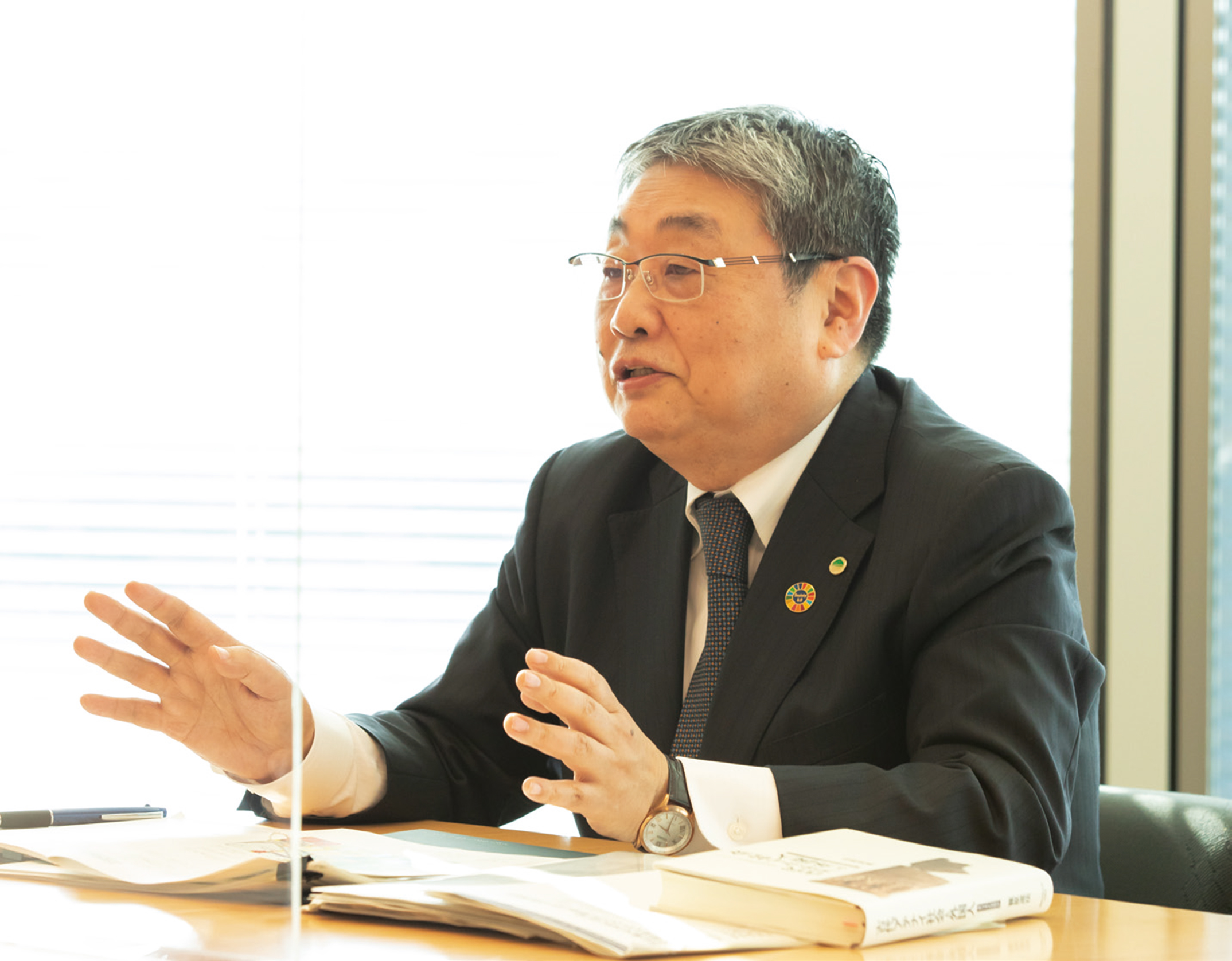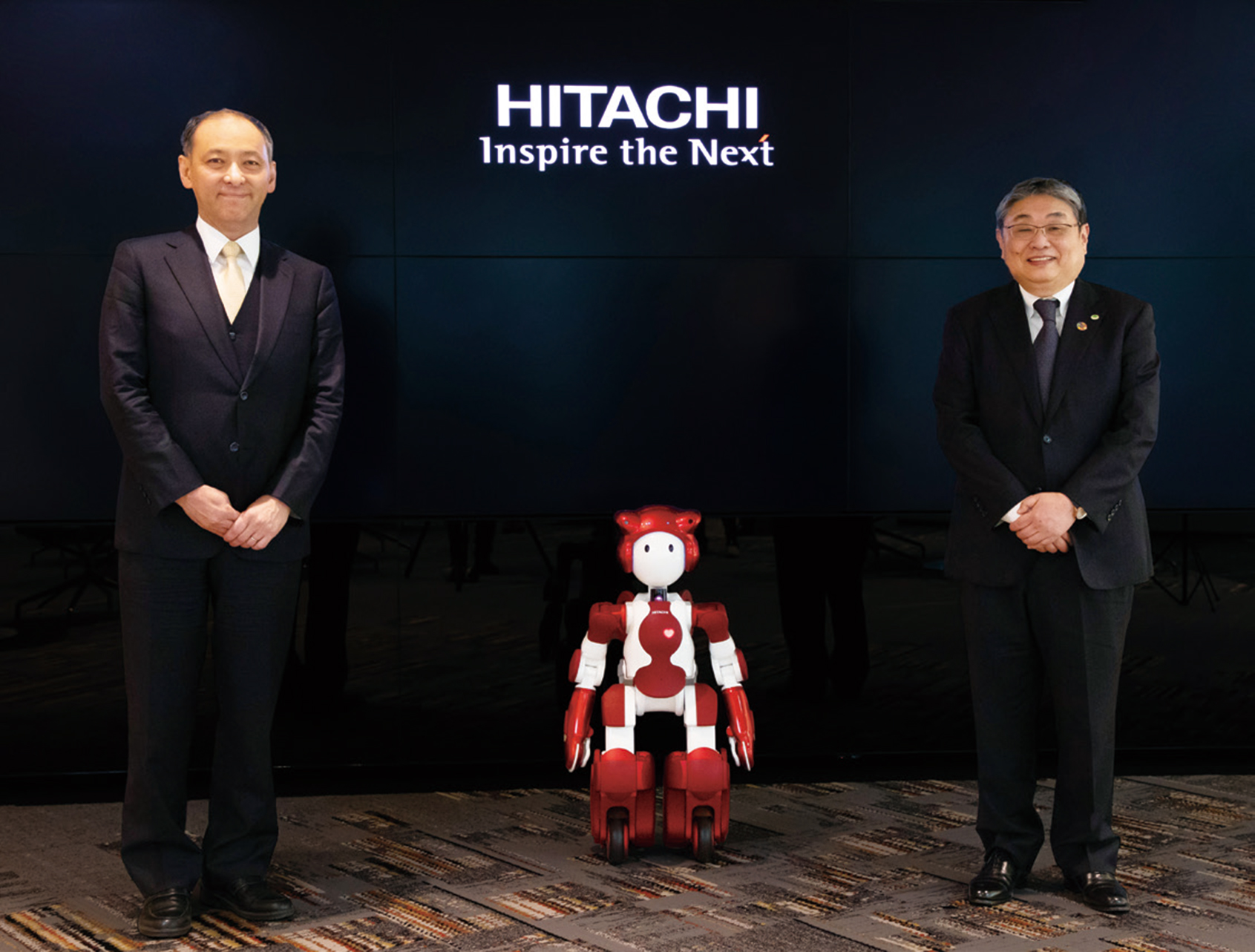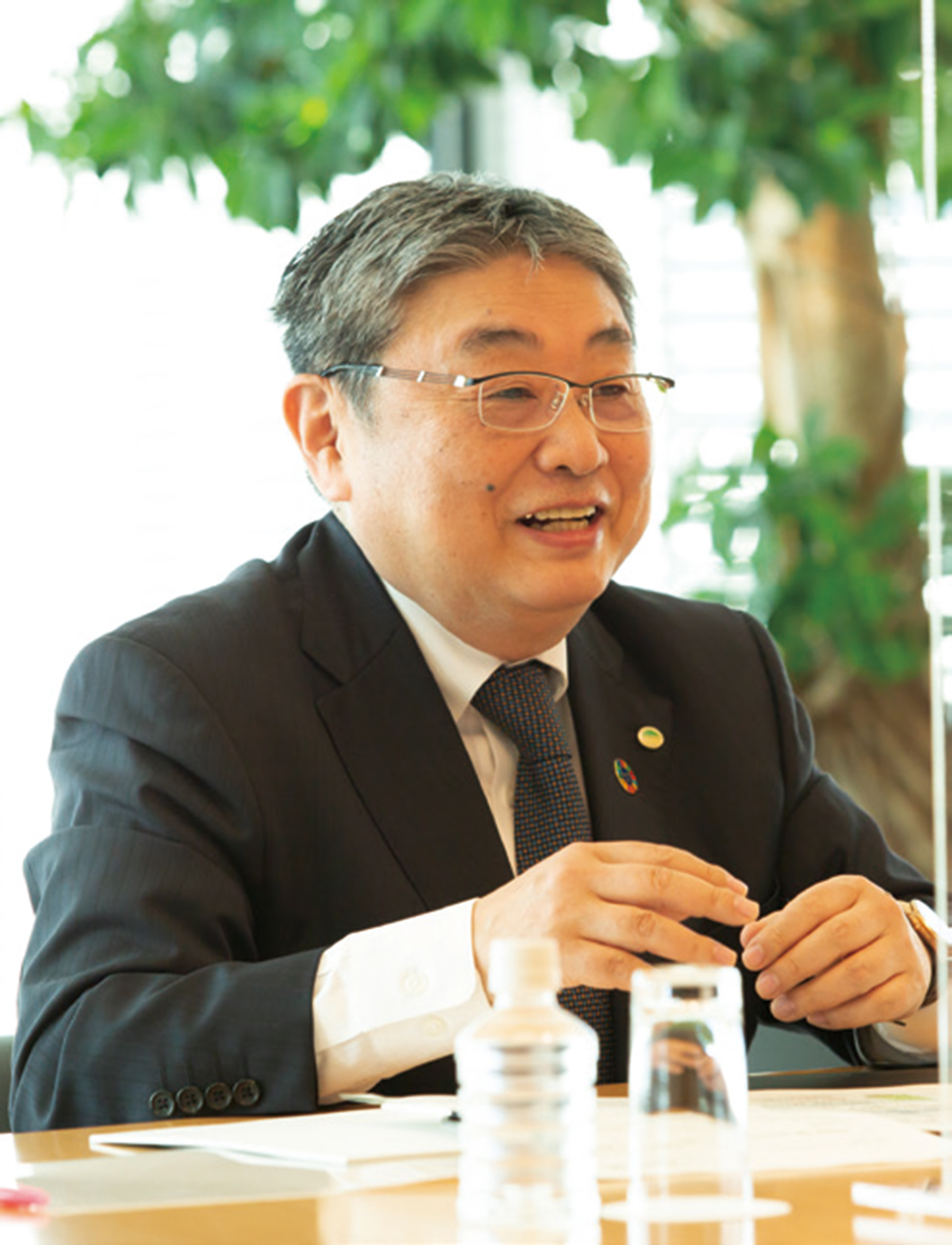Interviews with experts and opinion leaders from our research network
Knowledge creation is flourishing in this era of change, which has been heavily impacted by the COVID-19 pandemic. Humanity has accumulated a wealth of knowledge throughout its history of overcoming various crises. Then where is the origin of humankind’s intellectual innovation? Attention naturally turns toward ancient Greece. It is said that many of the systems of knowledge that continue to the present day originated in ancient Greece, particularly the nation state of Athens. For today’s talk, we have invited Professor Noburu Notomi of the University of Tokyo, who researches the birth of philosophy in ancient Greece. We will be hearing about the background to the cultural and academic boom in ancient Greece and how Athens gave birth to intellectual innovation, in addition to considering how to approach knowledge and cities. (Interview Host: Osamu Naito, Chairman of Hitachi Research Institute)

Professor, Graduate School of Humanities and Sociology, the University of Tokyo
Specializes in Western ancient philosophy
Born in Tokyo in 1965. After graduating from Philosophy Course, Faculty of Letters, the University of Tokyo, graduated from the Masters Program of the Department of Philosophy, Graduate School of Humanities, the University of Tokyo. Acquired a Ph.D. in Classics at the University of Cambridge in 1995. Served as an assistant professor at the School of Letters, Kyushu University from 1998 and as a professor at the Faculty of Letters, Keio University from 2008 before assuming his current position in April 2016.
Studies the birth of philosophy in ancient Greece from the standpoints of philosophy and Western classics. Involved in international research initiatives, including a stint serving as the President of the International Plato Society. Has presented his research on Platonic and Sophist thought in the West. In recent years, he has researched the acceptance of Western philosophy in Japan.
Authored works include Who Is the Sophist? (Jimbun Shoin), The Birth of Philosophy: Who Is Socrates? (Chikumashobo), Plato: A Now and Then of the Ideal State (Keio University Press), Philosophy with Plato : Reading the dialogues (Iwanami Shoten), Ars Dialectica (Kasamashoin), A History of Greek Philosophy (Chikumashobo).
Naito:Some of business managements are more interested in ancient Rome than ancient Greece, the topic of today’s talk. Founded in 753 B.C., ancient Rome lasted at least 1,200 years as a Republic and then an Empire, and many people associate it with sustainability.
On the other hand, thinking about the age and location where Western civilization first took hold—or in other words, where intellectual innovation first occurred—it was ancient Greece, and I found it particularly important to focus on Athens, the center of Greek civilization. It is said that a wide variety of people gathered in Athens at one point, and that academia and culture that have been praised and passed down to the present day blossomed there.
I’ll be asking philosophy researcher Professor Notomi to teach us extensively about how intellectual innovation occurred in ancient Greece, particularly Athens, from not only an ancient Greece perspective but also a global one.
Professor Notomi, the first thing I’d like to ask is whether you think that the age of ancient Greece’s rise and prosperity was an unique era with full of change.
Notomi:I do indeed. Ancient Greece is outstanding in terms of both the number of remarkable individuals and diversity of fields it produced. I believe we can say that its diversity exceeded that of the modern era.
I’m not saying that only ancient Greece was unique. Just as German philosopher Karl Jaspers expressed with the term “Axial Age,” the origins of the philosophy and religion of later ages were born around the time of 500 B.C., such as the birth of the Hundred Schools of Thought in China, the conception of Buddhism and Jainism in India, and the activities of the poets and philosophers of ancient Greece. While I may be somewhat biased towards ancient Greece because it is my area of research, I believe that it offers numerous suggestions among the cultural developments of this era.
Naito:Reading the Essays of French philosopher Michel de Montaigne, the three figures listed as “the most excellent men” were all from ancient Greece: Homer; Alexander the Great; and Epaminondas, an ancient Greek general and philosopher who worked to expand the power of his birth city, Thebes. It is well known that Montaigne was highly influenced by Plutarch,*1 a Greek writer said to have been active in the first and second centuries A.D., and I imagine that ancient Greek figures other than Plutarch must have appealed to this sixteenth-century moralist. So, just why did ancient Greece produce so many fascinating individuals? This made me want to relearn about ancient Greece from a historical perspective.

Notomi:During the Renaissance period, there was momentum to reexamine ancient Greece. As can be seen with Montaigne, there have been pushes to reexamine ancient Greece as an origin throughout many generations. Plutarch himself brought up even older Greek classics in his essays. It is well known that The Prince by Machiavelli, an Italian philosopher active a generation earlier than Montaigne, explores ancient Greek history.
There were activities that became the foundations of history in ancient Greece, and future generations have passed them down.
I think it is important that these two elements existed. Even if an outstanding figure appears in a certain place at a certain time, their influence will end if there is nobody to pass down their ideas and achievements.
Naito:I see. I hear that in the world of business management, innovation is considered to be brought about by combining existing knowledge, rather than creating something entirely new from scratch. The writings of Thucydides, known for The History of the Peloponnesian War, have recently been trending in the field of geopolitics. Thucydides describes the battle between Sparta and Athens as “a hegemonic nation against an emerging nation.” Professor Graham Allison of Harvard University coined the term “Thucydides Trap” to describe the dilemma of the inevitability of war when an emerging power challenges a hegemon. When people hear this term, they want to know what kind of person Thucydides was, and what the battle between Sparta and Athens was like. This is how the figures and achievements of ancient Greece are passed down.
Naito:As for why Athens produced academic and cultural achievements that are still passed down today, I believe the existence of places that encouraged intellectual exchange was a significant factor. Such public places included ecclesia,*2 courts, and theaters, while private places included banquets. I believe the existence of these places contributed to the dynamism of the people at the time. What are your thoughts?
Notomi:As you say, such places were set up meticulously throughout Athens. There were places that were between public and private, and there was a range of places existing in multiple layers with a variety of scales and spaces, from large gatherings of many people, to medium-sized locations, to those that were more small scale. There were many places that promoted communication in a variety of forms. The significance of ”places” is still relevant today.

Naito:Did everyone at the time who socialized at such places read, for example, Homer’s epic poem Iliad and learn its content? Of all the characters, I particularly like veteran army general Nestor. There is a scene during a strategy meeting where it is suggested to prepare a meal because no good ideas will be generated on an empty stomach. I sense the wisdom of elderly in such respects. I imagine that the people of Athens at the time shared and discussed such stories.
Notomi:Indeed. There was great significance in the fact that everybody knew the same things. If everyone has the same background, you don’t have to build from scratch when starting something new. Everybody spoke Greek and worshipped the same gods. Furthermore, I think we can consider the Olympic games, Iliad, and Odyssey,*3 an epic poem that stands alongside Iliad, to have been shared knowledge of the people of ancient Greece.
What’s more, rather than directly learning things through reading these works, the people read them critically and debated. You could compare it to the cultural critics of the present day. People would, for example, debate who was wiser between Nestor and Odysseus. In the fifth to fourth centuries B.C., the time of Plato and Aristotle, such debates were frequent.
Having something in common provides a starting point for dialogue and helps foster camaraderie. Even as times changed, Western intellectuals and leaders invariably read the works of Homer and Thucydides, regardless of whether they were involved in the liberal arts or the sciences. Even in the present day, it is common practice for politicians or business leaders to quote Plato. It is as if they are emulating the exchange of knowledge that took place at the intellectual ”places” of ancient Greece. Before we even consider things such as whether or not a certain book should be read, you can’t even enter the place if you haven’t read it.
Naito:Looking at the importance of sharing wisdom and knowledge in the field of business management, it is said that a key point for organizations to learn is how to transform implicit knowledge to explicit knowledge with maximum efficiacy. Implicit knowledge will not become explicit knowledge if nothing is done about it, so places for eliciting implicit knowledge are necessary.
Relating to the places concept, in the Hitachi Group, we have NEXPERIENCE,*4 which is a co-creation theory for creating new business and services through collaboration with partners. As part of that, Hitachi designers and researchers organize the expertise they have developed into methods, tools, and spaces. In this way, I believe that considering methods for interaction and creating places for it helps to generate knowledge. Ancient Greeks and the people of Athens liked debating, didn’t they?
Notomi:They really did. I think love for debate plays a role in stimulating interaction, and it would be difficult for us to engage in debate with Athenians seriously. The national character and culture of the people of Athens might have influenced their love for debate.
Naito:I suppose that people gathered in Athens because of its appeal as a city. But I imagine there was a time before Athens became so prosperous.
Notomi:In my understanding, Athens was not a very international city before the Greco-Persian Wars. For philosophy and the natural sciences in particular, pioneering regions included the Ionia region of Asia Minor, which was surrounded by the Mediterranean Sea and the Black Sea, south Italy, and Sicily, where ancient Greeks immigrated from the tenth century B.C. Athens was undeveloped in these fields.
However, in the fifth century B.C., reformer Cleisthenes, who established Athenian democracy, laid the foundations for the prosperity of Athens in the ages of Themistocles, founder of the Athenian navy that defeated the Persian fleet at the Battle of Salamis, and Pericles, considered a leader of Athenian democracy. The end of the sixth century B.C. and the dawn of the fifth century B.C. saw such massive change. Of course, triumph in the Greco-Persian Wars was a major factor behind the prosperity. By being persistent and not surrendering to Persia to the very end, it became a leading power.
Throughout the course of a century, philosophy and natural science rapidly prospered in the undeveloped Athens, and political and economic power concentrated in the city. What’s more, the people of Athens invited this situation. Rather than being planned, this process happened as a result of having the right environment in place. It was very well-made.
Naito:In Athens at the time, there were many so-called foreigners who visited from outside the city. I hear that while they did not have citizenship, many of them were involved in academic and artistic circle, and participated in rituals. I suppose they had a certain level of influence.
Notomi:That’s correct. Intellectuals came to Athens from outside, and were a good match for the indigenous culture of the city. People from a wide variety of backgrounds interacted in the city of Athens in the fifth century B.C.
While many poets who wrote tragedies and comedies were from Athens, the intellectuals active in the natural sciences mainly came from outside of Athens. The sophists (professional educators) were the same. Socrates was essentially the first Athenian philosopher in the field of philosophy.
Economic demand was the reason why intellectuals came to Athens from outside. The people of Athens asked to be taught about the natural sciences and rhetoric in exchange for lesson fees as part of citizens’ education, and these people came from outside to fulfil this demand. The majority of intellectuals active in Athens in the fifth century B.C. were foreigners. However, these outside intellectuals did not settle down there and stayed as guests, massively influencing culture.
Naito:Were there city-related factors that encouraged diverse people to come to Athens?
Notomi:Each “polis” (city), including Athens, was small, and I imagine that each polis alone did not have a complete economy and culture. There is no doubt that this led to increased movement among the people of ancient Greece.
But this remarkable inflow, gathering, and movement around Athens in the fifth century B.C. was something quite different from before. The citizens of Athens, meanwhile, made use of this movement of people and created open places that spurred on their politics, education, and culture.
Naito:Reading the dialogue Protagoras by Plato, there is a scene where Socrates lets an acquaintance know that Protagoras, considered the founder of sophists, is in Athens, and the acquaintance is surprised. Reading on reveals that Socrates paid a certain level of respect to Protagoras, and we can see a different side to Socrates than his usual probing with numerous questions, which was quite refreshing.
Notomi:The beginning of the Protagoras is a representative scene that symbolizes the circumstances of the latter half of the fifth century B.C. A young person visits Socrates excitedly and says that he would like to learn from Protagoras if he is in Athens. The young person was intellectually excited by the prospect of meeting an intellectual. This shows Athenians’ thirst for knowledge.
Naito:Just what is a city that manifests intellectual innovation like? When thinking about how to bring about such a city, in the present day, we need to include the progress of digital technology. This is even more true in the recent circumstances where the COVID-19 pandemic has brought about changes to the conventional communication method of in-person meetings.
Notomi:Recently, I do sense the potential and scalability of dialogue through digital technology.
My lectures at the University of Tokyo were nearly all held online in the last academic year. Through lectures I do sometimes feel that something is amiss about the lack of physical means of communication, such as lines of vision, breathing, and unspoken harmony. I imagine that many people might have experienced this, but when you align your line of sight to a person displayed on your screen, your eyes look downcast to the other party because your camera is in a different location.
On the other hand, tools such as computers and apps enable those who were unable to participate in communication to join conversations and debates. I believe this could help eradicate social disparities. Achieving things that weren’t previously possible will lead to new discoveries and uncover issues. You could also take this as a kind of huge social experiment. An increase in remote communication going forward will lead to further consideration of the relation between being or not being physically present in a place and engaging in communication.
Naito:You use digital technology to communicate with students remotely. Not only that, but you communicate with Athenians living 2,000 years ago masterfully using your knowledge and imagination.
When thinking about the dynamic city of Athens, the initiatives of Matsuyama City in Ehime Prefecture come to mind. It is one of the implementation fields of Hitachi-UTokyo Laboratory’s*5 Habitat Innovation*6 project. With an aim of using data on the behaviors of individuals and digital technology to solve social issues and improve quality of life, work is underway on a pilot to realize smart cities. When you look up, you see Matsuyama Castle, which evoke images of the Parthenon temple built on the Athenian Acropolis I guess. When you went to Athens, did you think of the people and neighborhoods of the time?
Notomi:Indeed. I use my imagination to travel around the streets of Athens. And when I do so, I am actually moved by how there really is nothing. The place where Plato once established his Academy*7 in 387 B.C. is now a normal neighborhood park. I first went there when I was a student. In the exact location where Plato and others debated, I too debated with my fellow researchers. My imagination was soaring and I was moved.

Naito:There must be some sort of place memory.
Notomi:There certainly is. The Academy was originally a spiritual place for worshipping the god known as Academus. It is perhaps because of this history that the site is a forest even now, separated from apartments. You might compare it with shrine precincts in Japan. It is an appropriate location to get away from the hustle and bustle of living spaces, calm one’s mind, and debate.
Naito:We also call the research and development initiative established in our Central Research Laboratory "Kyōsō-no-Mori"*8 (forest of collaborative creation). While preserving nature as much as possible—approximately 30,000 trees of primeval forest in Musashino—we create an environment for research and development where visitors can feel the abundant natural surroundings. To the Hitachi Group, it’s like the Academy.
Notomi:Environments with greenery and forests are important to humans.
Naito:When thinking of how to bring about a city full of intellectual stimulation like Athens, the concept of “human-centric” is a given, I suppose. In the H-UTokyo Lab initiative to realize the data-driven smart city that I mentioned earlier, we are striving to realize a human-centric society. Cities where people think and discuss tend to be lively, and it is precisely this liveliness that breathes life into a city. While keeping human-centric as a premise, incorporating new knowledge and technology brings out the human-centric concept even more.
Notomi:How new knowledge and technology are created and used is a question that really makes us think. On the other hand, after continually studying a society of two thousand and several hundred years ago, I’ve come to believe that new things are not created as a result of pursuing novelty. Novelty doesn’t have any value in and of itself. So, I feel that pursuing novelty is a little bit like putting the cart before the horse. This is because novelty isn’t obtained when you try to make something. When I look at students’ essays, those that have been written with an emphasis on novelty tend to focus too much on the details, and aren’t particularly outstanding overall as an essay.
So, what are the intrinsic aspects of creating new knowledge and technology? I think that people who think properly and work on proper aims will invariably be accompanied by new knowledge and technology. As for what I mean by “proper,” you could rephrase it as the “classic approach.” If you take the classic approach, new things will be created.
We who live in the present age often perceive things to be new which actually already existed with the ancient Greeks and Chinese over 2,000 years ago. You can’t call something that happened in the past new. But once again, taking the classic approach in the present day may well have a powerful impact.
Research at universities creates knowledge that helps facilitate innovation in both the liberal arts and sciences. Most of this knowledge is not created through researching with the aim of bringing about innovation. More often, innovation sprouts during fundamental research on something that researchers consider to be intrinsically important. I believe this is the correct way.
Naito:I was really eager to talk about “knowledge of ignorance” and “awareness of one’s ignorance” with you today. “Muchi-no-chi (Knowledge of ignorance)” is well known in Japan as a translation of Socrates’s saying, but you say that there are misunderstandings about this phrase and that it should be changed to “awareness of one’s own ignorance”.*9
Notomi:I’m grateful that you brought this issue up. I believe that the prevalent view that Socrates said “knowledge of ignorance” was a fundamental misunderstanding. The phrase “knowledge of ignorance” makes people feel like they understand what it means, but actually it doesn’t make sense. What’s more, like you said, Plato, who passed on the words of Socrates, did not once mention Socrates talking about “knowledge of ignorance”.
I believe that the popularity of the term “knowledge of ignorance” in Japan is a sign of many people know of and are interested in Socrates. Socrates was already very popular in the Meiji era (1868-1912). This led to his words becoming distorted and gave way to the misunderstanding that he said “knowledge of ignorance”.
In a way, I do want to recognize the popularity of Socrates’ ideas as a good thing. But I think that we need to make right this situation where something he didn’t say has been spread in an incorrect form.
Naito:When I was in high school, my friend said, “people say ‘knowledge of ignorance,’ but I don’t understand. What does it mean to know, even though you do not know?” and, “Doesn’t that just mean that you think you don’t know something?” We brought up the subject with our ethics teacher, who replied, “Your questions are valid. Please study at university. But ‘knowledge of ignorance’ will definitely come up on the university entrance exam, so if you don’t learn it, you won’t be able to enter university.”
Notomi:Intresting. Recently, high school textbooks have finally started to show “knowledge of ignorance” alongside “awareness of one’s own ignorance”, or they might have an annotation saying that the term used to be known as “knowledge of ignorance”. It seems like we’ve made a half step forward.
Naito:Philosophy and the history of philosophy put great importance on words, so I imagine your struggles.
Naito:You worked on compilation as one of the responsible editors of the nine-volume series A History of World Philosophy published by Chikumashobo in 2020. I’m reading through and enjoying the series in order.
When I was reading, I found something you said in the introduction to the first volume is particularly important: “World Philosophy is an attempt to examine the world with philosophy, and to reexamine philosophy itself from a global perspective.” It is clear that you are trying to reexamine philosophy by comparing thought structures in a comprehensive global context, rather than simply dividing it into Western and Eastern philosophies, and synchronically rather than diachronically.
Notomi:I find “attempt” to be a very appropriate way of putting it.
This series comprises nine volumes—the first eight volumes and the ninth, a separate volume themed around opening up the future—but it isn’t structured so as to provide a comprehensive overview from a global perspective. Each volume has its own structure, and you might find it a little bit disorganized. But that’s where the fascination lies. Once you start reading, you should start to see that there are a variety of different ideas even in the same age.
At the same time, all of the editors, including myself, do not tell the reader how to think and how to interpret things. We simply present the information we have collected and leave it up to the reader to decide from what angle to look at it. The world must seem different to readers who like Eastern thought and to those who think that philosophy only exists in the West.
There are wonderful philosophical activities across all ages and regions. I thought it necessary to work on picking up on such things. We used the English term World Philosophy as a translation for the term ‘sekai tetsugaku’. It isn’t Global Philosophy. Behind this is a desire to examine philosophies one by one that have not been picked up on before, rather than examine philosophies in a uniform way. We believe that doing this will reveal a diverse range of things that will exceed our expectations.
Naito:If we interpret things as if they are predetermined with a singular perspective, we may lose sight of the opposite side and lose a sense of true understanding. When you leave Japan and go to another country, that country is depicted as being in the center on world maps. People often say “Think Globally, Act Locally,” but at the very least I think it’s important not to fix one’s perspective.
Notomi:In World Philosophy, I think it is important to take a variety of perspectives, not just one, and to shift and combine perspectives when looking at things.
I am working on World Philosophy in partnership with researchers from around the world, such as the West and China. But, the way I see it, Japan is in the ideal position to work on World Philosophy.
Naito:Really? Why is that?
Notomi:It’s because Japan is so well-balanced that it’s practically astounding. Japan incorporates Western philosophy while having elements of Indian and Chinese philosophies. What’s more, the Western philosophy incorporated in Japan is not only that of the English-speaking world, but also French, German, and Russian-speaking countries. Of course, there are elements of indigenous Japanese philosophy. Japan is the only country in the world that preserves such a balance.
Naito:Is that so? I can understand that this is a very worthwhile attempt that boosts expectations about Japan’s role.
Notomi:I believe that Japanese people are characterized by being well balanced, not trying to impose their ideals on others, and being attentive to a variety of things. It seems important to be aware of this position in fields other than philosophy, too.
Naito:I’m getting even more excited about continuing to read A History of World Philosophy series.
Naito:Could you give us some advice for our thinktank activities from a philosophical or classical Western perspective?

Notomi:While I can’t really say anything grandiose, I would like to discuss the origins of the concept of universality in Greek philosophy.
Naito:Universality? I have wondered why ancient Greek classics have a universality that transcends age and country and are well-received by people around the world. It’s quite interesting to hear that the concept of universality itself originated in ancient Greece.
Notomi:Ever since the times of ancient Greece, we have been using the word universal on a daily basis. It was actually originally coined by Aristotle, who called it “καθόλου (kathólou).”
This word means “applies to everything.” But it isn’t a case of simply applying to everything. Being intrinsically applicable is important to universality. Principles that apply to all locations, ages, and people are universal.
But in the age known as postmodernism following World War II, there emerged those who denied universality. They thought that people who emphasized universality were essentially just imposing their ideas on others. Relativism and pluralism became stronger in place of universalism.
However, since the beginning of the 21st century—and particularly in the past five years—the concept of universality has been reemerging in the field of philosophy. Philosophy publications featuring the word universal in the title have been increasing in number over the past few years.
Naito:What sort of causes are behind this?
Notomi:A while ago, there was a tendency to reflect and criticize the idea that emphasizing universality would lead to prosperity and happiness for all humankind. Recently, however, there are a growing number of people who think that universality, facts and truth are at the foundation of philosophy, and should be reconsidered. This means exploring more seriously the meaning of universality. A sort of backlash is occurring.
In the present day, whether it be economy or politics, China has its own logic, and so does the United States. It is not a matter of seeing which logic is winning, but universality must be ensured somewhere when aiming for a common goal.
It might be difficult for you to think about universality in corporate activities. However, it is clear that we are now entering an age where universality cannot be taken as self-evident, where we must think about how to ensure universality and foster a perspective and mindset of viewing the world universally.
Once again, I think it would be a good idea to consider universal as a keyword whose meaning should be explored.
Naito:At Hitachi, we are currently trying to create social value, environmental value, and economic value through social innovation. While economic value can be objectively quantified, it is difficult to quantify things like social value. When considering such value, reexamining universality might be important in passing on to the next generation.
Thank you for your time today, and for providing important keywords and messages.
*This talk was held with physical distancing measures in place.

Hippocrates, the father of medicine, left behind the saying “ὁ βίος βραχύς, ἡ δὲ τέχνη μακρή” (Art is long, life is short). The word τέχνη (tékhnē) in original Greek means technology, which, as it is the word of Hippocrates, refers to medical technology. In other words, it meant that life is short but technology discovered via medicine will save people’s lives over the long term, so we should be mindful of that. However, this was later interpreted to mean art. In the midst of the COVID-19 pandemic, I believe that the talk with Professor Notomi of the University of Tokyo has provided lessons from the wise men of ancient Greece that can be used in the innovation manifestation process or for intellectual smart cities. We also hope to create long-lasting value.
Osamu Naito
Chairman, Hitachi Research Institute